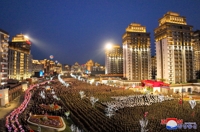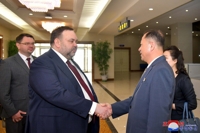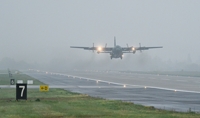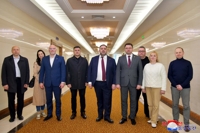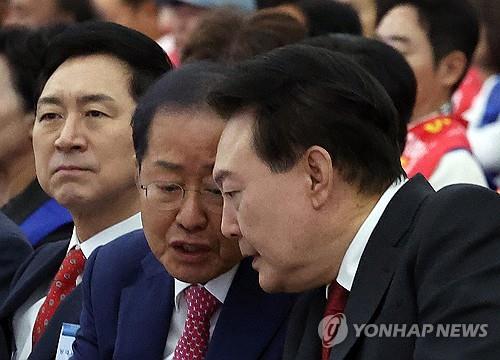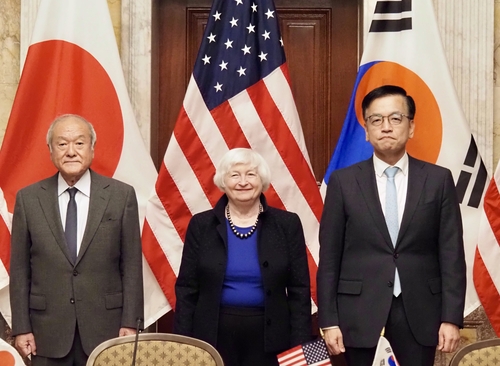(News Focus) Trump puts alliance on edge with THAAD cost pressure
By Lee Chi-dong
SEOUL, April 29 (Yonhap) -- U.S. President Donald Trump has presented a new bill to South Korea for Washington's regional security commitments against North Korea's threats, heralding thorny negotiations between the allies.
Whether he intended to or not, his reported comments on the cost of an advanced U.S. missile defense system here has added fuel to political disputes in South Korea with its presidential elections less than two weeks away.
He has given additional ammunition to South Koreans resisting the deployment of the Terminal High Altitude Area Defense (THAAD) system.
Trump was quoted as telling Reuters Friday that he wants South Korea to pay the cost of the THAAD being installed here, which is estimated at US$1 billion.
In another media interview, he reiterated his view without elaborating.
"Why should we pay for it?" Trump told the Washington Times. "It's a phenomenal protective system, best in the world by far, and that's meant to protect South Korea. So I respectfully say that I think it would be appropriate if they paid for it."
His exact intention remains unconfirmed, as the White House is maintaining a vague stance.
"I think we'll have more on that for you at some point," White House press secretary Sean Spicer told reporters when questioned.
But Trump's remarks caught South Koreans off guard. Although they are divided about whether a THAAD battery in South Korea is actually necessary, especially with China's opposition, they believed that Washington would pay all or most of its cost.
"The THAAD battery is primarily aimed at safeguarding U.S. forces in South Korea from North Korea’s ballistic missile attacks," the JoongAng Ilbo, a major daily in Seoul, said in an editorial. "It can also protect South Koreans in other parts of the country, of course, thanks to its broad coverage."
It added, "Uncle Sam can't demand Seoul bear the cost of the battery. As the missile defense system is a U.S. forces' asset, Washington is responsible for its cost."
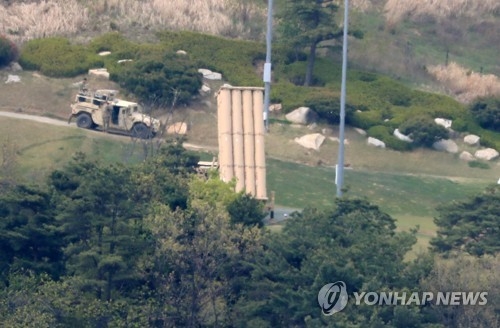
The U.S. missile defense system, called THAAD, is deployed at a former golf course in Seongju, North Gyeongsang Province. (Yonhap)
The South Korean government also emphasized that it does not make any sense for Trump to pass an additional financial burden for the THHAD unit to Seoul.
In a related deal last year, the defense ministry pointed out, the U.S. agreed to fund the equipment and its maintenance.
South Korea has already provided land for the THAAD deployment site in Seongju, North Gyeongsang Province, under the bilateral Status of Forces Agreement (SOFA) on the legal rights and other details on thousands of American soldiers in South Korea and their presence.
Ministry officials said there's a "written" agreement between Ryu Je-seung, who was deputy minister for defense policy at the time, and Lt. Gen. Thomas S. Vandal, commander of the U.S. Eighth Army. The document is classified, however.
If true, it indicates no legal problems between the two sides.
What's worrisome, however, is the potential impact of a tug-of-war over money to the mutual trust and health of the alliance itself.
Seoul and Washington are bracing for another round of talks likely to start early next year on sharing the cost of stationing U.S. troops here that currently number around 28,500.
The five-year contract, which calls for Seoul to pay 920 billion won ($809 million) each year, is to expire in 2018.
"South Korea is sharing some 70 percent of the total cost, including its provision of land for U.S. Forces Korea bases," said Cho Han-beom, a senior researcher at the state-run Korea Institute for National Unification.
If South Korea is forced to pay more due to THAAD, it would mean using American soldiers as "mercenaries," he argued.
Moon Jae-in of the liberal Democratic Party has claimed the issue of positioning THAAD in South Korea should be reviewed by the next government. He is the front-runner in the presidential race, according to opinion polls.
Moon says the administration of impeached president Park Geun-hye made the THAAD decision in a unilateral manner without collecting public opinion or consulting neighboring countries.
Moon is known for advocating a "balance" in South Korea's relations with the U.S. and Japan, having served as chief of staff to late president Roh Moo-hyun who sought less influence from Washington politically and militarily.
Kim Hyun-wook, a professor at the Korea National Diplomatic Academy, cited a realistic setback.
"It would be hard to retract the THAAD deployment itself or avoid some cost burden," he said.
On the campaign trail, Trump often described some American allies as "free riders" and called for more financial support from them.
He even hinted at a possible withdrawal of the USFK, a stance he seems to have reversed after his inauguration.
Trump, a former businessman, may be placing maximum bets on the cost-sharing for the missile shield or playing the THAAD card for an advantage in his pursuit of renegotiations on the free trade agreement with South Korea, observers noted.
One U.S. resident in Seoul who asked to remain anonymous said Trump demanding payment for the missile battery only after it was already installed was a cheap landlord's tactic.
In fact, many are critical of the outspoken president for his confusing rhetoric.
"His messages to both adversaries and allies are very unorthodox, and in my view, costly to the U.S. national interest," said Daniel Pinkston, a lecturer in international relations at Troy University in Seoul. "I don't know if it is deliberate or a mistake. I often wonder if the bluster and noise from the administration is targeted at the U.S. domestic audience without consideration of the consequences in the international realm."
Pundits stressed the need for South Koreans to cope with Trump's demand in a cool-headed way.
"We don't need to overreact to his every word," Wi Sung-lac, who served as Seoul's top nuclear envoy and ambassador to Russia, said. "A prudent attitude is necessary, as it is unclear whether he is asking South Korea to purchase the THAAD system deployed here or using it as a bargaining chip for gains on other affairs," he said.
lcd@yna.co.kr
(END)
-
 Defense chief says N. Korea's hypersonic missile 'unsuccessful' in last-stage glide flight
Defense chief says N. Korea's hypersonic missile 'unsuccessful' in last-stage glide flight -
 N. Korea has capability to genetically engineer biological military products: U.S. report
N. Korea has capability to genetically engineer biological military products: U.S. report -
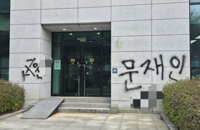 Man in his 40s nabbed for spray-painting slurs toward ex-President Moon
Man in his 40s nabbed for spray-painting slurs toward ex-President Moon -
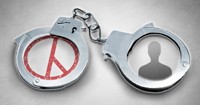 Police catch 1,681 over alleged election law violations
Police catch 1,681 over alleged election law violations -
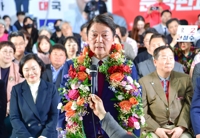 PPP lawmaker says entire Cabinet should resign over general elections defeat
PPP lawmaker says entire Cabinet should resign over general elections defeat
-
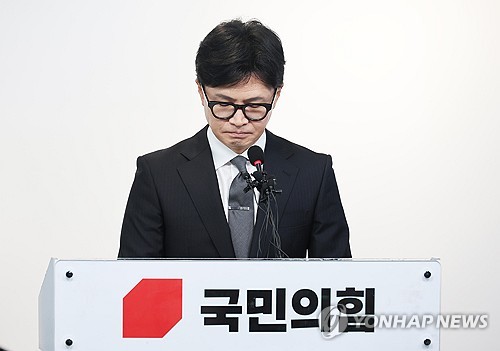 Ruling party leader resigns following election defeat
Ruling party leader resigns following election defeat -
 Defense chief says N. Korea's hypersonic missile 'unsuccessful' in last-stage glide flight
Defense chief says N. Korea's hypersonic missile 'unsuccessful' in last-stage glide flight -
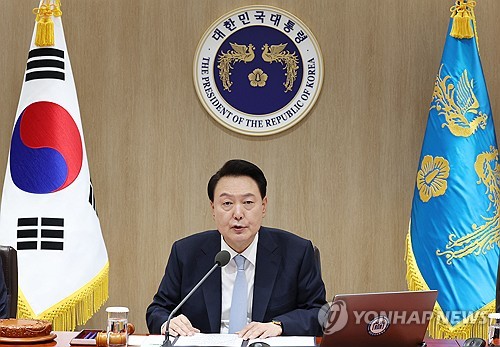 (LEAD) Yoon vows to improve communication with people after election defeat
(LEAD) Yoon vows to improve communication with people after election defeat -
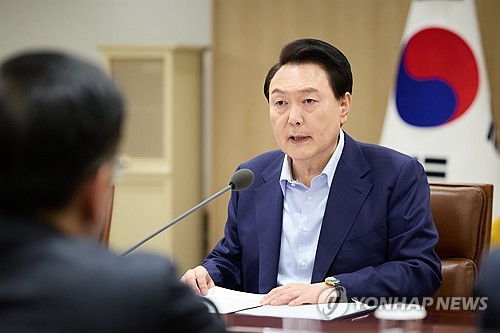 Yoon presides over emergency meeting on Mideast crisis
Yoon presides over emergency meeting on Mideast crisis -
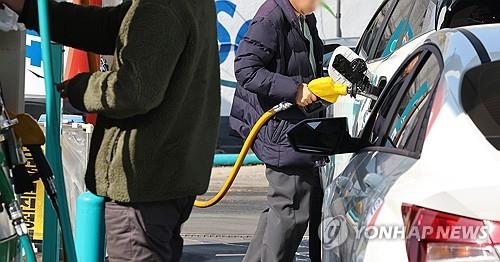 (LEAD) S. Korea to extend fuel tax cut through June amid Middle East tensions
(LEAD) S. Korea to extend fuel tax cut through June amid Middle East tensions
-
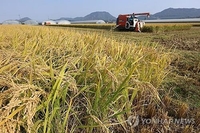 S. Korea to provide 100,000 tons of rice to 11 nations
S. Korea to provide 100,000 tons of rice to 11 nations -
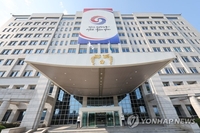 (LEAD) Presidential office denies Moon aides under consideration for PM, chief of staff
(LEAD) Presidential office denies Moon aides under consideration for PM, chief of staff -
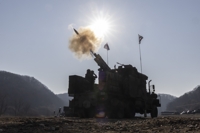 Army, Marine Corps conduct live-fire drills near border with N. Korea
Army, Marine Corps conduct live-fire drills near border with N. Korea -
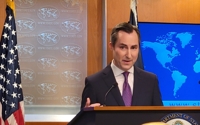 U.S. 'incredibly concerned' about suspected N.K.-Iran military ties
U.S. 'incredibly concerned' about suspected N.K.-Iran military ties -
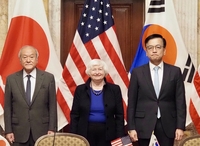 (4th LD) Finance chiefs of S. Korea, U.S., Japan recognize 'serious' concerns over 'sharp' won, yen depreciation
(4th LD) Finance chiefs of S. Korea, U.S., Japan recognize 'serious' concerns over 'sharp' won, yen depreciation















